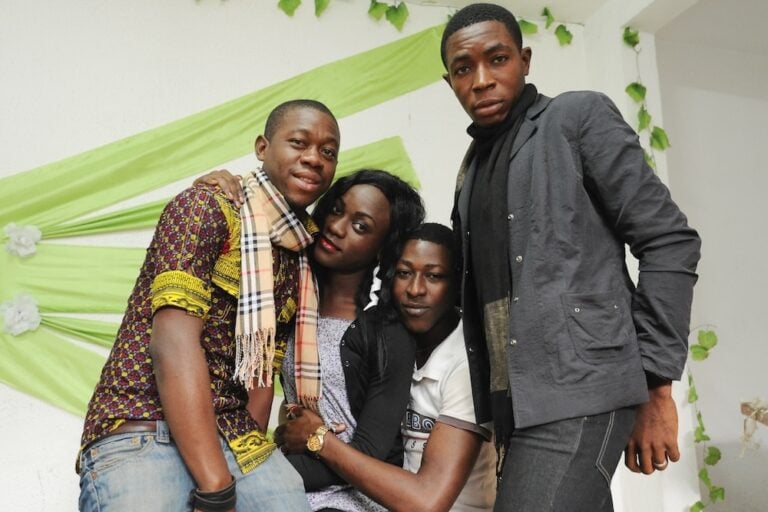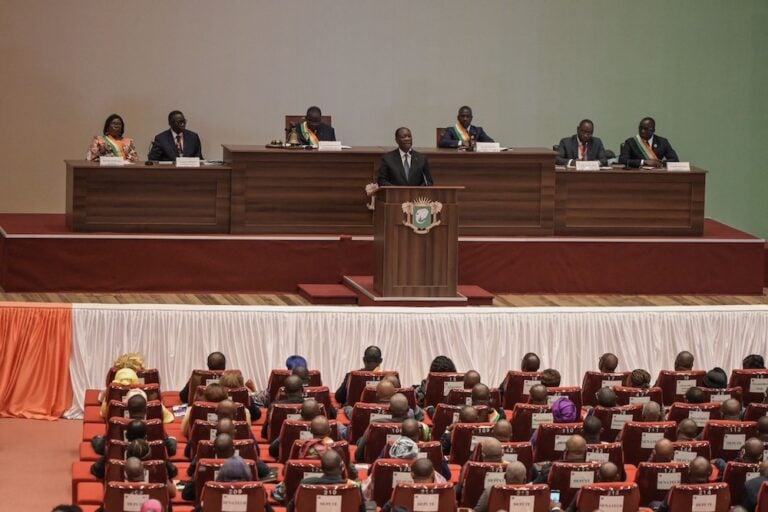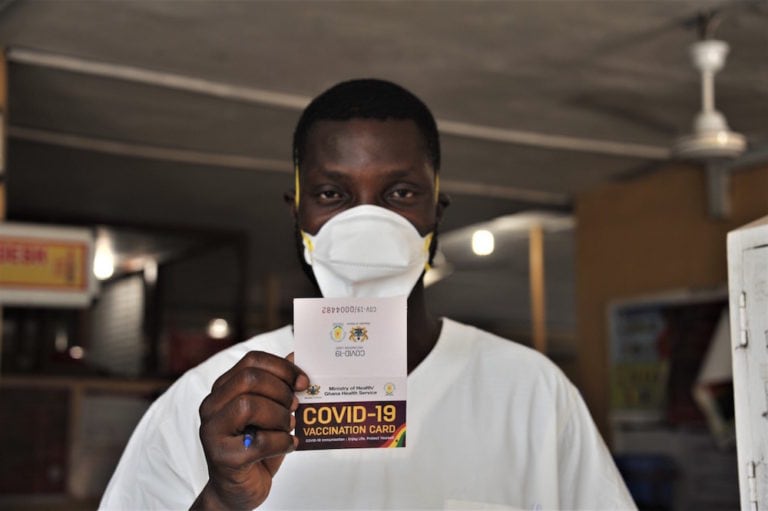(RSF/IFEX) – The following is a 10 November 2004 RSF press release: Abidjan state media mix propaganda, disinformation and incitement to riot The state media in Ivory Coast have become the exclusive mouthpiece of the government and its allies and are being used to promote street demonstrations, Reporters Without Borders said today after monitoring many […]
(RSF/IFEX) – The following is a 10 November 2004 RSF press release:
Abidjan state media mix propaganda, disinformation and incitement to riot
The state media in Ivory Coast have become the exclusive mouthpiece of the government and its allies and are being used to promote street demonstrations, Reporters Without Borders said today after monitoring many state radio and TV broadcasts.
The organisation said the broadcasting of hate messages and countless unverified news reports has aggravated the ongoing violence in the Abidjan area and it urged the state media to act responsibly. After the ransacking of opposition newspapers last week, the state-owned radio and TV stations have become the most important source of news and information for residents of Abidjan, the country’s economic capital.
“In times of crisis like this, journalists must take extra care and make a special effort to be professional in their work,” Reporters Without Borders said. “It is unfortunately clear that this has not been the case with the Ivorian state media during last weekend’s violence in Abidjan. We must point out, in particular, that the state media are continuing to broadcast biased reports and appeals for riots, despite calls for a return to normality by the authorities.”
Reporters Without Borders added: “If President Laurent Gbagbo does not want to be accused of saying one thing and doing another, he must ensure that the official media are no longer used as tools for organising and mobilising the pro-governmental ‘Young Patriots’.”
Religious imprecations and hate messages
With few exceptions, the reports carried on Radio Côte d’Ivoire (RCI) and RadioTélévision Ivoirienne (RTI) have strayed completely from journalism into propaganda. Interspersed with nationalistic songs, phone-in contributions and interviews, RCI presenters flatter the “patriotism” of their listeners.
Yesterday, shortly after 10 a.m. (local time and GMT), a preacher from the Church of the Living Word went on the air with violent imprecations. “The country must be delivered from the evil ones,” he said, claiming that French President Jacques Chirac is “inhabited by the spirt of Satan.” Ivory Coast was “divided into two blocs, with the Devil’s bloc on one side and God’s bloc on the other,” and it was up to the “patriots” to ensure that the second prevailed, he said. His monologue ended with a ringing “Amen, pastor” from the two RCI presenters.
Throughout the 90 minutes of Reporters Without Borders’s monitoring of RCI yesterday, the same two presenters regularly punctuated their live comments with such slogans as “Vigilance, patriots” and “Thanks be to the fatherland.”
This morning on RTI, Reporters Without Borders noted that President Chirac and the French soldiers of the Force Licorne were systematically referred to as “settlers” and “imperialists.” In general, comments and reports tended to focus on the claim that France is in the process of carrying out a “coup d’etat” against Ivory Coast, despite the denials by both the French and Ivorian military.
From political messages to organising in the field
The Ivorian state media are also being used to organise street activity in Abidjan. More than 24 hours after President Gbagbo called on demonstrators to “return home,” RCI’s broadcasts yesterday were still referring only to the “mobilisation” call made by the Young Patriots, a pro-Gbagbo civilian militia, Reporters Without Borders found.
Although leaders of the Young Patriots swear that a few “rebel infiltrators” are to blame for the violence and appeal for “discipline” and “non-violence” on the part of demonstrators, their messages have a double-edge when they are not openly insurrectionary.
Yesterday on RCI, shortly after 9:30 a.m. (local time and GMT), a Young Patriots nurse called on supporters to give medicine to the treatment centre installed near the Hotel Ivoire and then made a “patriotic appeal” to Abidjan residents to “go out, go out.” At the end of the afternoon, activists stationed outside the Hotel Ivoire appealed on RTI for “patriots” to join their “brothers” on the street, Reporters Without Borders noted. The presenter who welcomed them into the studio told them they had her “support.”
The RCI presenters meanwhile appealed to Abidjan residents to make donations to the Young Patriots. They thanked a woman who promised to make her car available to them and invited an elderly man who has donated money several times to speak on the air.
Today at 11 a.m. (local time and GMT) Reporters Without Borders heard RTI presenter Francis Aka begin by “paying homage” to the “young people who say no to French imperialism,” who “are blocking the conspiracy hatched by France against our country” and to whom Ivorians “owe their survival.”
He then gave over the microphone to the president of the United Youth for Laurent Gbagbo’s Ideas (JUILG) and the secretary-general of the pro-Gbagbo Union for Democracy and Progress (UDP), who appealed to “young people (. . .) to mobilise against France, the unmasked aggressor.” Ivorian youths were urged to “go to the headquarters of RTI, the presidential residence and the radio stations” and to thereby “continue the mobilisation until our country is completely liberated.”
Disinformation and incitement to riot
The head of the Young Patriots, Charles Blé Goudé, gave the signal for the anti-French uprising on the evening of 6 November on the air on RTI, urging his supporters, “wherever they are,” to “take to the streets.”
Pascal Affi Nguessan, the head of the Ivorian Popular Front (FPI) – the president’s party – meanwhile went on television the same day to ask the Young Patriots to “massively” take over the streets of Abidjan in order to forestall any action by “foreign forces present on the national territory until total victory.”
During the ensuing rioting, the state media carried false information and rumours that triggered the street violence. On 8 November, for example, the national radio station, on several occasions, carried “reports” that French soldiers were conveying a “political leader” in one of their armoured vehicles and intended to take him to RTI headquarters so that he could publicly proclaim himself president. RCI presenters subsequently urged Abidjan residents to go out and place gas canisters in the streets to prevent the French troops from circulating.
RCI also spread the rumour that the purpose of French troop movements was the removal of President Gbagbo and it urged “patriots” to form a “human shield” around the president’s home.
National Assembly president Mamadou Koulibaly went to RTI headquarters the same day to give a long televised speech claiming that the government had “won the war” because it had “proved that France is [the] adversary.”
“Rumours” that “bring down republics”
After delivering inflammatory addresses live on state media, several Ivorian leaders seem to have realised the dangers of these media excesses. After meeting with the French commander, Gen. Henri Poncet, the chief of staff of the Ivorian Armed Forces, Gen. Mathias Doué, late on 8 November called on everyone to “pay no attention to rumours” that were the source of mistaken “interpretations.” Such interpretations, he said, just “complicate a situation which we [the Ivorian armed forces] can resolve.”
Koulibaly, the National Assembly president, then warned that “the most foolish rumours are the ones that bring down republics the fastest.”
Despite these comments, UN spokesman Fred Eckhard deplored, on the evening of 8 November, that the Ivorian media were continuing to disseminate hate messages against at foreigners, and he reported that 800 residents of foreign origin had sought refuge and protection at the premises of the UN mission in Ivory Coast.
Previous muzzling of opposition and independent press
The Ivorian Armed Forces offensive against the positions of the ex-rebels in the north of the country was preceded by a crackdown on free expression. A significant part of the press was silenced after the ransacking of several opposition newspapers by pro-government militia, the sabotaging of the FM transmitters that relay the programming of Radio France Internationale (RFI), the BBC World Service and Africa N°1, and the abrupt removal of RTI’s director-general and his replacement by a government supporter, Jean-Paul Dahily.


